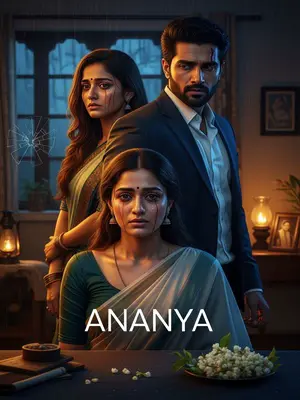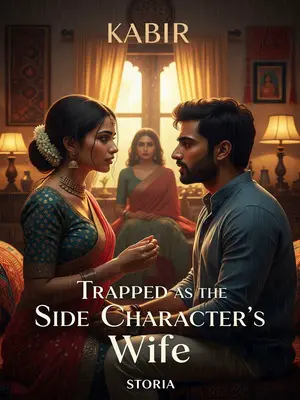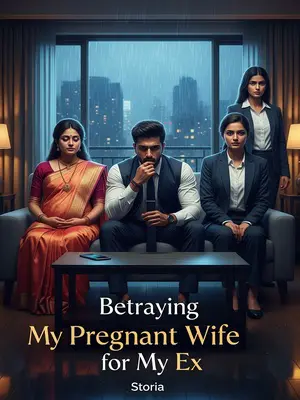Chapter 3: Showdowns and Schemes
My usually cheerful saasu maa was reduced to a shadow, kneeling on the floor, scrubbing every inch with tissues. The sight was jarring—gone was the woman who scolded my husband for leaving socks on the sofa. Now she wiped the marble tiles as if germs might sprout at the old lady’s very presence.
My reasonable sasur ji trembled, barely daring to breathe, pouring chai with shaking hands. “Sugar, Ma?” he whispered. The old lady just snorted, waving him off.
My husband called out, voice weak: “Dadi...”
He sounded like a little boy, afraid of the monster under the bed. My heart ached for him, but there was nothing I could do—yet.
He pulled me into our room, muttering, shutting the door softly behind us.
"Wife, pack your things, let’s go stay somewhere else for a few days. You’re pregnant, you can’t get upset."
He paced, running his hand through his hair. “Accha suno, Priya, let’s just go—hotel, friend’s place, anywhere. Your health comes first.”
My phone buzzed: PayTM, thirty thousand credited from my in-laws.
Sasur ji followed up with a WhatsApp: "Beta, take care of yourself. Sorry for this trouble." The meaning was clear: escape while you can. Once the old lady left for Lucknow, we could come back.
It was classic Indian family diplomacy—pretend not to see, but quietly help you slip away. I almost laughed at the desi-ness of it.
"Is she really that scary?" I tried to sound brave, but my voice trembled. Was it all exaggerated?
"Not just scary. She’s a nightmare." My husband looked like a schoolboy awaiting punishment. “If she wants, she’ll turn the whole house upside down, yaar.”
He recounted her legendary deeds in a whisper, as if afraid she’d hear through the walls. When he was six, she made mutton curry from his beloved rabbit, tricked him into eating it, then dragged him to see the bloody skins.
He shuddered at the memory. I pictured a tiny Rohan, clutching a toy, forced to witness the unthinkable. My fists clenched for him.
She’d sat on the cot, cracking peanuts, spitting shells at his face. “Bas, stop crying! You’re not a girl, are you?”
"It’s just a beast. Dead is dead. Why are you crying like that? Not a shred of manliness. Don’t go telling people you’re Shanti Devi’s grandson. Remember, beta—a beast is a beast. It never comes before your own blood."
The memory soured his mood. He wiped his nose on his sleeve, eyes wet. I squeezed his hand in silent support.
His mother tried to comfort him, but the old lady kicked her aside—literally. Saasu maa stumbled, dupatta slipping, humiliation sharper than pain. The old lady was a hurricane, sweeping away all in her path.
"You shani! Always teaching my grandson nonsense. It’s just a dead rabbit—want me to die too?"
Shani. My nani’s favourite insult too—more a curse on your luck than anything else, the ultimate saas weapon.
That kick cost my saasu maa a child—a three-month-old girl. She wept in the hospital, inconsolable. Even years later, she’d light a diya on the anniversary, eyes brimming, the pain never spoken but always present.
The old lady lit agarbatti at home, declaring, “Bas, ek aur nuksan ho gaya. Yeh sab maya hai, beti. Dead is dead.” She never let anyone forget who ruled the house.
"Just a money-drainer. Gone is gone. Why cry?"
Sasur ji, unable to bear it, tried to reason: “Ma, she was your own flesh and blood!”
"That was your own granddaughter!"
But her heart was stone. Even Sheru, sensing the tension, whimpered under the sofa.
She spat out a paan leaf, voice thick with scorn. “Granddaughter, huh! What’s the use of girls? One less, one headache less.”
"Not even born and you call her my granddaughter? With that one kick, I saved you money. Instead of thanking me, you want to question me? Thankless! Married a wife and forgot your mother."
She recited her grievances as if reading from a script—family honour, money, male heirs.
Sasur ji, in his anger, wanted to leave with his wife and son. He packed a small bag, hands shaking. Saasu maa wiped her tears, clutching Rohan. But leaving isn’t simple in our families—the weight of elders’ words outweighs any suitcase.
The colony’s panchayat was called. In the common hall, neighbours clustered, kids peering in, someone passing samosas on a steel plate, all straining to catch every word of the family drama. “Izzat ka sawaal hai,” they whispered. “Aaj kal ke bachche, no respect.”
Among the elders, reputation was everything. “Log kya kahenge” hung in the air, thicker than incense.
Sasur ji tried to plead, but his voice was lost in the crowd. Chacha ji smirked, knowing the old lady was on his side. Colony uncles nodded, but no one dared cross Shanti Devi.
She spun her tale, twisting black to white. By the end, sasur ji was painted heartless, my mother-in-law the villain. Money flowed to the eldest chacha ji—flat, college, everything. She kept her battered notebook: “For the family,” she claimed, but everyone knew who really benefited.
Finally, chacha ji married his boss’s daughter, and the old lady left to enjoy Mumbai. Only then did she release sasur ji’s family. Peace returned, like the first monsoon rain after summer.
Now, standing at our door, she berated sasur ji, finger wagging, voice echoing down the corridor. “Izzat ka khayal hi nahi hai, besharam!”
"Ungrateful brat! Now you’re successful, big flat, fancy car, while your elder brother’s family eats dal-chawal. Think you’re something special now, don’t you?"
She listed every slight, voice rising. Neighbours gathered, pretending to fix slippers but really listening.
"Ma, we never—"
She cut him off, bangles clinking as she waved him silent. “Shut up, troublemaker! If you hadn’t egged him on, would my son ignore his mother? You can run, but I’ll find you. The money you owe your elder brother—I’ve kept a record!”
She threw down a yellowed notebook with a dramatic thud. Sasur ji picked it up, flipping through trembling fingers—loans, debts, imaginary expenses.
"Ma, when did we owe over four lakh?"
"It’s four lakh seventy-eight thousand six hundred fifty-one rupees and thirty-seven paise! If your brother hadn’t gotten sick saving you, he’d be an army officer. This is a discount—because you’re my son."
My husband muttered, “Arrey baap re, is this a family or income tax office?”
"Ungrateful brat! Not only do you not repay your brother, you hide with this shani!" She shouted, “Sab sun lo! Yeh hai mera beta, naalayak!”
She glared at my saasu maa, eyes blazing. I feared she might swing her stick again.
"It wasn’t elder brother who saved Rohan, it was Rohan who saved elder brother!"
Saasu maa stood her ground, but got a stinging slap in return. The sound echoed, her hand flying to her cheek, tears springing to her eyes. My fists clenched under the tablecloth.
"You shani! I said elder brother saved him—so that’s final!"
Saasu maa, defiant, stood tall even as her eyes watered. I moved closer, ready if things turned uglier. In that moment, I swore—no one would ever treat me like this, not while I breathed.
The old lady declared: “My eldest grandson is marrying soon. Clean this flat and hand it over to Aniket as his wedding house.”
She surveyed the living room, already plotting where the mandap would go. The audacity!
"No way! This flat is for Priya and Rohan." Saasu maa, covering her cheek, refused. Her voice trembled, but her spirit didn’t. I felt proud—someone was finally standing up to the terror.
"You troublemaker! Who gave you the right to speak?" The old lady slammed her stick, daring anyone to answer.
As the argument raged, I slipped to the dog cage and released Sheru, whispering, “Chal beta, teri bhi chance hai.”








